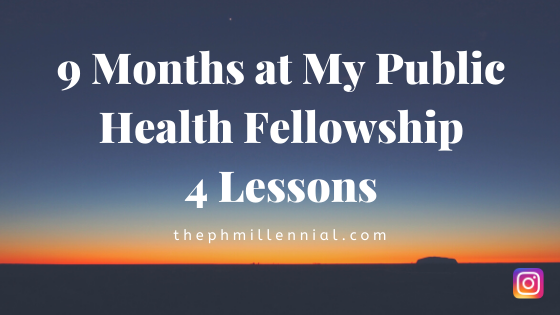9 months as a community health fellow for a health foundation. It’s crazy to think that just over a year ago that I was offered this opportunity which I exhilaratingly accepted.
I look out my window and it’s snowing while I write this. Last year I was in Gainesville, Florida and now I am in the US’s both most Northern and western state, Alaska. Never in my 24 years of life had I thought I’d live or even visit Alaska. Now I’m here more than anywhere, as it slowly becomes a home for the while.
It truly is a testament that if you put yourself in a position to execute on the things you want then new and beneficial opportunities can open up to you.
Support The Public Health Millennial on BuyMeACoffee
(Related: 6 Months At My Public Health Fellowship | 5 Lessons)
Reflection
It is quite remarkable that 9 months have already passed since I’ve been in my fellowship position. It has been such a rewarding experience. I can’t wait to see what the last 3 months of my fellowship has in store for me.
Growing into the professional I want to be. I’ve been looking and thinking about my next step. Though this will continue to bubble on my mind for the coming weeks. It’s crazy to think we see 1 year as such a long time. Yet, it always flies by. You just have to make sure to make the most of it. Right?
4 years in undergraduate, 2 years in graduate school and 9 months into my career. And still don’t know what the next step is. The planning process has begun and I’m looking forward to what my next big career decision will be.
4 Lessons Learnt
These lessons don’t do with technical skills, rather just things that have I’ve been realizing over the last 3 months.
Change is inevitable
I know its cliche to say that “change is inevitable,” but I still think this is a powerful point to keep in mind.
You are going to go from one job role to another. From an undergraduate school to a graduate. From a school to a career. These are bigger changes, but there are also going to be smaller changes.
The foundation I work for is currently in the hiring process for 8 new positions. Which is going to include my supervisor (my boss) who is leaving the organization at the end of April.
As you may know, I am on a one year contract that ends in June 2020 and part of my fellowship has been getting mentorship with her throughout my time. This creates a unique opportunity for me to advance my program evaluation skills. As we are the two employees that work in that role.
As I sit and think about what is best for my future. Do I try to stay on in a new role? Do I look for another job in state or in another state? Some of the questions that wander on my mind. Whatever I decide, change is coming and coming quicker than possible.
Strategies
Since change is inevitable, you have to be resilient and prepared for all parts of your career and life. Always try to make decisions from a position of strength rather than a position of weakness. So for the most part this is just going to mean that you are going to need more information.
Figure out what you want for you 1, 3, 5, and 10 year goals. Write it down. What skills are going to be most valuable for your next step up?
Once you figure this out then I advise you either talk with mentors, peers, or reach out to persons in positions you want to be in. Get information and insights from them to build your case for what is your best next step.
Remember that your future goals can change as you go along your path. So develop the skillsets that can be transferable.
(Related: How to Write a Research Paper Fast)
Your perspective is important
You may not think that you know anything on a topic. But trust me, when you get hired people want to hear your perspective.
For me, I’m the youngest person in my organization and the only black person. I also hold an MPH which only my supervisor and I hold. Additionally, I have been in Florida for the last 6 years. I will inherently view things a little differently from others who I work with.
I’ve realized now that sometimes just sharing your perspective on a topic, even if you think it is pointless, it will be giving value to the team. You could validate something that someone was thinking, you could get coworkers of thinking about the issue from a new lens.
The more I work, the more I think its important to hear from varied perspectives to ensure that everyone can come to a consensus (or not) or just to hear new insights on a topic.
Speak up on share what you think on topics. Your coworkers will be thankful that to get value from what you are saying.
Strategies
Although I’ve been in my position 9 months now, in many situations I still feel new to the job. Therefore, in situations when I feel less confident, I always listen first before I speak. If you try to speak prematurely about a topic, you .
Always ask questions though. Don’t sit down and pretend like you understand when you clearly do not. You can only give your most value if you understand what your team is talking about.
In situations when you are confident – this could be when you are knowledgeable about best-practices in an area – let your expertise shine. It’s important when you are an expert on something to not only speak, but also ask questions. This will help inform the discussion on the topic and give better perspective to the conversation.
(Related: 4 Keys to Thrive in The Intergenerational Workplace)
Organizational culture is undervalued
Looking back on my current fellowship as well as my internships during graduate school. I can’t stop but to think how blessed I have been to be in two organizations where the company culture helps me excel.
Organizational culture can be manifested in many ways such as in work environment, communication style, company mission/vision/values, and leadership structure.
Working in an organization whose culture aligns with yours sets you both up for success. Too often we focus on the name of the organization, the salary, or the role that we will have while forgetting about just how important organizations culture is to our overall fulfillment and success.
When you are interviewing make sure that you try to find out about the company’s culture. See if it aligns with the sort of workplace you want to live in.
Strategies
Though it can be difficult to understand an organization’s actual culture until you start working. You should be trying to get information on this to ensure you are happy in your new role.
Firstly, you can ask someone who works or use to work at the organization you’re talking about. How do people talk about their colleagues? About their boss? Find out during your interview what is the work environment like.
Secondly, you can use a website like Glassdoor to check reviews of the organization. It would be most beneficial if you did this during your job search phase.
Thirdly, you can ask current employees for informational interviews. This will help you to better gauge the organization’s culture and learn more about the work being done.
Know the vestment period for your 401K
So I learnt something about my 401K plan that no one talks about. For those of you who don’t know, a 401K is a an investment retirement account through an employer.
A great benefit of the 401K is that there is usually a employer contribution if you decide to deposit a percentage of your Paycheck automatically. For example, at my organization, if you automatically deduct 5% to go into your 401K plan then the organization gives you a matching contribution of 4%.
Let’s say that 5% ($50) of your income is directly deposited into your 401K plan each paycheck. Then your organization deposits 4% ($40) into your 401K plan. So in total $90 is deposited into your 401K plan each paycheck. This is amazing as it is essentially “free money” for your company for saying that you are going to put this percent of your income away for retirement.
However, there is a catch. And one that millennials should absolutely pay attention to. This is the vestment period for your 401K. A vestment period is the amount of time that an employee has to stay at an organization to get part or all of the matching contribution.
Typically its incremental in the how much of the matching contribution you get (seen in table below).
| Vestment time (time stayed at company) | Percentage of match contribution received |
| 1 year | 20% |
| 2 years | 40% |
| 3 years | 60% |
| 4 years | 80% |
| 5 years | 100% |
Though not all organization have incremental vestment periods. Some may say you can only get 100% of matching contributions after 1 year.
Considering your organizations vestment period can be important because maybe you aren’t going to stay long and another retirement investment strategy would be better than the 401K. Regardless, investing for your future in a 401K is never a bad place to start.
(Sign up for a free M1 Financial Brokerage Account)
Strategies
Always find out the vestment period for your organization. Ask about it in the interview process.
If you are already in your position, then you can look into your organizations 401K plan and see what the vestment period is before you decide to invest into the 401K. Typically, you only get access to your 401K after 90 days of employment. So learn about your vestment policy during this time.
Always talk to your financial advisor and tax advisor before making any decisions as this has implications for both your financial future and your taxes.
Millennials are changing jobs every 2 to 4 years so knowing the vestment period for your 401K plan could better inform your retirement planning.
(Related: Why you need these 3 Hobbies in Life)

Summary
To summarize, my first 9 months has been a great learning and developing experience to start off my career post-graduate school.
This article goes over:
- Change is inevitable
- Your perspective is important
- Organizational culture is undervalued
- Know the vestment period for your 401K
It’s important to reflect in new roles to see what we have learnt. And how we can use this knowledge to better impact the job we are doing.
What’s something you learnt from your job position?



